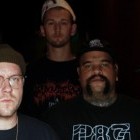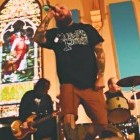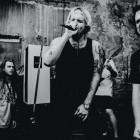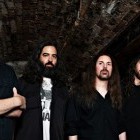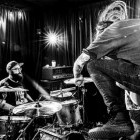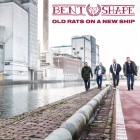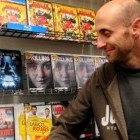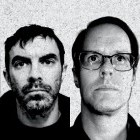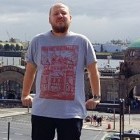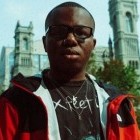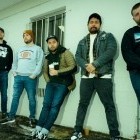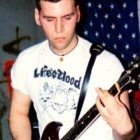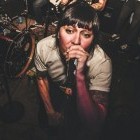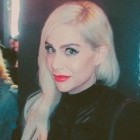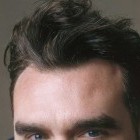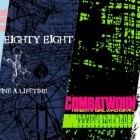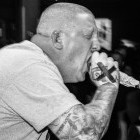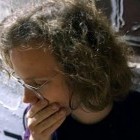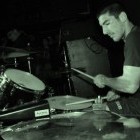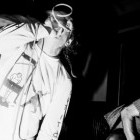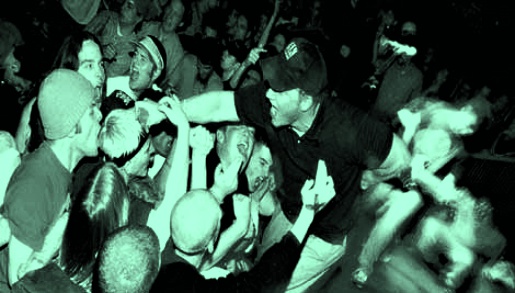
His work as a singer (Endeavor, Burnt by the Sun), guitarist (try.fail.try), and bassist (NORA) has helped secure Mike Olender's place in the hardcore and metal history books. Now living in North Carolina, Olender was an integral part of the New Jersey underground music scene starting in the early '90s. A politically-minded thinker, he's also been very active in social causes, dedicating his professional career to human advocacy.
A family man, these days Olender is back playing music again, this time reuniting with two of his former Burnt by the Sun bandmates in River Black, a crushing metal band that will be releasing its debut album this coming summer.
In this new interview, I chat with Olender about his life in music, and how everything has come back full circle for him.
Tell me about your early life a bit.
Well, I was born in Maine and lived there for the first year of my life, and then my family moved to New Jersey. I grew up near the beach, near Long Branch and Asbury Park. I actually lived in Jersey up to four years ago.
Did you come from a strict family?
Home was pretty active. I was the youngest of five kids. There’s 12 years between me and my oldest sibling. It was a fairly conservative and religious family and upbringing. That brought on some interesting times when I became a teenager [laughs]. But generally, it was a pretty standard suburban upbringing.
SEE ALSO: 2016 interview with Mike McTernan (Damnation A.D., When Tigers Fight).
When did the rebellious streak come out in you? Was it through music?
I got into skateboarding when I was about 13, and I really got attracted to the energy that came with it. It was raw, unorganized, and independent, and I just loved that freedom and spirit. As I got more into skating, I began reading Thrasher magazine and I saw all of these bands being talked about in their music section that I had never heard of before. Before long I realized that there was a real connection between the energy of skating and the energy of punk and hardcore. I immediately gravitated towards that because it spoke to something that was inside of me.
As I got more and more into that kind of music, my parents didn’t understand it, or me, to a large degree. That ultimately lead to some pretty significant understandings and strains between us. So, in a way, I blame it on the music, but I also blame it on skateboarding and the culture that came along with it.
At what point did you start meeting other kids that shared the passion you had for skating and hardcore music?
Just earlier this week, I was in Detroit and I ran into an old friend of mine named Steve who actually was the one who helped me make that connection between skating and hardcore. It was really funny when I first met him when we were kids because I remember he was wearing a Youth of Today shirt and I said, “I think I saw that band name in Thrasher!”
The music thing really took off for me in my mid-teens because I found much more in that compared to the skating, which was more of an energy thing. My parents raised me to really appreciate civil rights and that struggle, and I found a lot of those same values in hardcore, in particular, NYHC. That lead to many strong friendships in school for me. When you found someone at that age who was into that kind of music back then, you instantly became friends.
This is the point when you start going out to local shows. Who were some of the local bands that you remember seeing that inspired you to begin your own path as a musician?
When I was in high school, the bands that I communicated most with were ones that I found through contact info on their records. New Brunswick was only about a half hour away from where I grew up, and that’s where bands like Lifetime and No Escape were based. They would put out EPs and include their actual phone numbers in the sleeves. That was probably a huge mistake because people like me and my friends would randomly call these numbers up [laughs]. I actually got to know Ari Katz from Lifetime pretty well from that. A couple of years later, we got to work together and became closer, but it started by me calling him from his number being in that record.
One band that I befriended that was right in our immediate area was Iconoclast. They wound up being on Ebullition Records. I got to know them well. They were a more of a straight-forward punk band. The bands that really inspired me the most were all the Revelation Records bands, but I didn’t know any of those guys.
So what was the first band you actually got off the ground?
The first band I played in never had a name, but we wrote and practiced a lot. These were just some kids I knew from the area that I hung out with. From there, I got to know more people through them and then started a new project that ended up becoming Endeavor. The original name of that band was In the Name of God, which was meant to be more a poke at religion. The lyrics I was writing at the time were very critical of organized religion. But none of the other guys in the band were into the name, so we changed it. I was about 16 when we started that band.
I didn’t see Endeavor live until years later, so how was those earlier shows like back then for you guys?
In our area of Central Jersey, the place to play back then was Middlesex County College. That was the mecca of hardcore in our area. It drew bands from all over the world when they passed by Jersey on tour. The Endeavor shows there were always fun. Yeah, sometimes they were small shows, but they always were fun. I loved playing basement shows as well. My buddy Josh Grabelle [founder of the Trustkill Records and Bullet Tooth Records labels] that I grew up with used to do shows in his basement, and for a lot of the local bands, that was our chance to play with bigger bands that we loved. For me, the smaller and more disorganized shows were always the more fun ones.
Let’s talk about some of the other bands you played in during that era.
Around 1998, things with Endeavor started to wind down. About a year before that, I started NORA along with [Ferret Records founder] Carl Severson and Chris Ross. I played guitar in that band. That was secondary to Endeavor, but we were pretty active. Around that time I was also playing guitar in a band called try.fail.try. That was a band out of New Brunswick. So I was playing in three bands at the same time at one point. It wasn’t a long period of time, but it was busy.
When I think of the work you’ve done in Endeavor and Burnt by the Sun, your lyrics and stage presence immediately come to mind. Was it tough for you to relinquish that kind of control and simply play guitar in try.fail.try and NORA?
That's an interesting question, and I haven’t thought about that in a long time. There were times that I really enjoyed just being the guitar player. I don’t want to say hiding behind my instrument on stage, but not being the front and center person was fun at times. But, yes, I probably didn’t acknowledge it to myself, but there was definitely a bit of a struggle at times not being the singer.
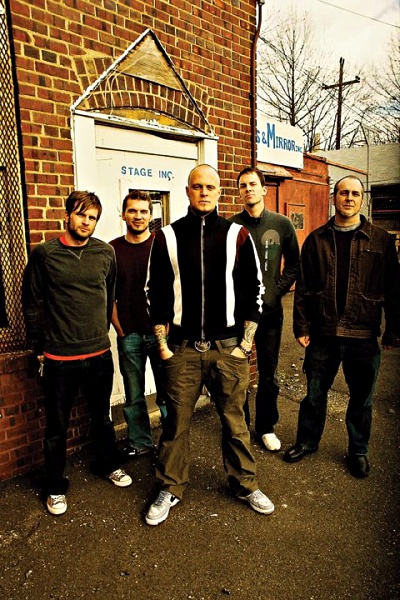
In terms of singing, how did you handle touring in regards to keeping your voice in shape?
I never did a lot of touring. The longest single time I probably toured was during the Endeavor years. That was in the mid-‘90s when we toured Europe and then the States back to back. Touring can be very difficult if you’re a singer and want to sound as good as you do on the records. I used to get really stressed out about that when I would be out on the road. I even had polyps on my throat at one point.
SEE ALSO: Record Collector: Tim McMahon (Search, Mouthpiece, Hands Tied, Face the Enemy, Triple Threat)
Did you drink out on the road?
Yeah, I did, and drinking never really had an effect on my performance level. In fact, I always found that I would perform a lot better if I had a few in me [laughs]. I think it had a way of relaxing me and letting my natural and physical instincts take over during the shows.
So I’m playing with Dave Witte and John Adubato in Black Army Jacket. We break up and then they start Burnt by the Sun. How did you end up working with them?
When they approached me about possibly joining the band, they already had material written. The way I recall it, I was playing a show in New Brunswick with NORA, and Dave and John came to the show. I found out later on that they had come there with a purpose [laughs]. After the show they explained to me that they had started writing songs and heard my voice singing over their music.
I was flattered because they were friends, but I idolized them as musicians as well. Human Remains [Witte’s earlier band] were so unique to the underground scene in Jersey—inspired by Ripping Corpse, obviously— but so amazing and talented. Everybody worshipped Witte for his ability. So I was really excited about the idea of playing in a band with him.
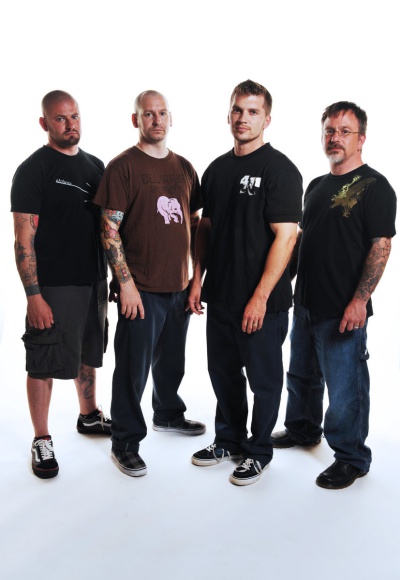
I know the feeling!
Actually, myself and one of the guys from try.fail.try had tried to start a band with Witte and Ben Weinman from Dillinger Escape Plan at one point. I think we practiced twice together, but it didn’t happen [laughs]. The timing wasn't working. So when the Burnt by the Sun idea was brought to me a year later, I was in. I heard the music they had written and it was no-brainer to me.
Of all the songs Burnt by the Sun did, I always remember “You Will Move” being the one that really connected with people on a deeper level.
I would agree with that. “You Will Move” is the song that got the best response from people when we played it live. I think the vocal bridge towards the end of the song gives people the opportunity to do the whole singalong thing when we played it.
It’s a song about self-empowerment and seizing life. I think that resonated with a lot of people. Often times when I sang that one, my emotions came through, and that carried through to people when we played live.
When Burnt by the Sun broke up in 2004, were you at peace with that?
I was definitely at peace with it. When the band broke up, we had just finished the last date of a tour and I was getting much more serious about my work. I was working as a community organizer and George W. Bush has just been reelected and pushing through with an agenda that I really didn’t agree with. So I was motivated to put all of my energy into doing something about that.
I was also doing a web radio show at that time. This was before podcasts had become a real format. It was a weekly radio show where I did interviews and spoke about the week in politics. So I would on the road with the band and sitting in the van recording episodes of my show while the band was at the bar.
How did Burnt by the Sun end the first time around?
We were in the van going home after that last show and Witte said to us, “I love you guys, but I’m done. It’s been a lot of fun, but I don’t want to do this anymore.” So right when that happened, in my mind, I realized I was out too. I think the strain of touring and the desire I had to do my work was overwhelming, so that was it for me.
In the couple of years that Burnt by the Sun were split before coming back for the last album, did you miss being in a band?
As Burnt by the Sun was approaching that final year, I started singing in For the Love Of. They were a pretty influential metalcore band from Jersey in the mid to late ‘90s. They inspired bands like God Forbid and had a very loyal local following. I was always a huge fan of theirs. They got asked to do a reunion show at Hellfest and since they didn’t speak with their singer anymore, they asked me if I would do it. One show lead to more, so I was doing periodic shows with them. After Burnt broke up, I kept doing shows with For the Love Of.
How did Burnt by the Sun end up reuniting for the Heart of Darkness album in 2009?
There was an email chain between the guys in the band talking about we had signed a deal with Relapse Records for three albums. I think one of the guys had spoken to Matt Jacobsen from Relapse and he confirmed that if we wanted to do another record, we could. So that’s what we did.
I know you have two kids now. Were either of them born already by the time of the last Burnt by the Sun run?
When we did that final record, it was right before we had our first child. So I was 34/35 and I took advantage of that record to get a lot of stuff out. I wanted to explore some dark themes with the lyrics. Once I did that and started my family, I was satisfied and was fine with not doing a band for a while. But I never said to anyone, or myself, that I was completely done with being a musician. I live this music. I love it and it’s been part of my DNA since I was a kid. That’s never changed. So I never completely closed the door on the band thing.
SEE ALSO: 2016 interview with Tracy Wilson (Positive No, Dahlia Seed, Ringfinger).
Now that you have a different career and family, how did you handle joining River Black? Were you brutally honest with the guys that you weren’t going to be able to commit to full-time touring?
There’s a pretty long timeline with that. Back when John [Adubato] and Dave [Witte] began writing together again—couple of years after Burnt broke up—they approached me about singing in a new band they were doing with Brett Bamberger, who is now in Revocation. They said it was different from Burnt by the Sun but similar in some ways, and we want to go out and hit the road, and so on. I told them right out of the gate that I wasn’t interested in going out on tour, or making any kind of commitment like that to a band with those kinds of expectations. For me, it was all about being the best father and husband I could be, and secondly, being committed to my work.
So they went with another singer and then they changed it up and got someone else, and then went on to a third singer [the three singers: Dimitri Minakakis, Chris Alfano, and Harrison Christy]. But things weren’t working out with that third singer, so around the end of 2015, John reached out to me and asked if I was interested. Through the years between those other singers, they would contact me to see if I had changed my mind or not. But this time I had already wanted to get creative again, so it was perfect timing. In fact, I had emailed John asking if he had any old song ideas recorded that he could send me so I could mess around with it in my little home studio. I was feeling that itch to do something again.
So, yeah, John reached out to me after that and said, “Look, things aren’t working out with this other singer, we really are at the end of our rope here and we’re bummed out because we signed a deal with Season of Mist to put out a record, and this is all gonna fall apart. If you want to do this with us, we can do it and there will be no longterm commitment you have to make. We’ll play the shows we want to play and take it from there. Let’s make it fun and stress-free.” It was the right opportunity at the right time for me.
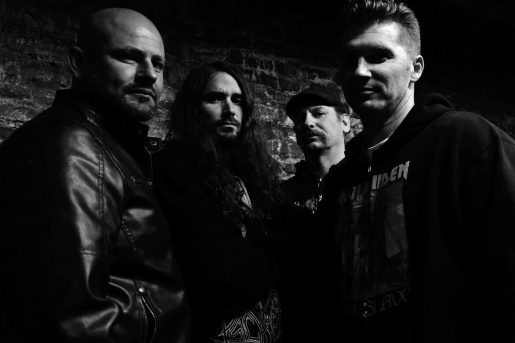
It felt right.
Yeah, I think that first weekend I laid down vocals for three of the songs. I felt so inspired. It was a long road to get there, but once it felt right, I jumped on board.
How would you describe River Black’s sound?
It has a Burnt by the Sun feel to it because it has John and Dave playing together, but it’s way more rhythm focused and straight forward. It’s got more of a groove to it. It’s funny, but one of the criticisms I used to get from my hardcore friends was that we wouldn’t stay on our good parts long enough [laughs]. With River Black, the songs breathe a bit more, which is great for me, because I love the driving force that these songs have.
Now that you’re gearing up for the release of the River Black album, what do you hope to get most from this experience?
I really want to continue what I’ve already been experiencing with this band and that has really just been a reconnection to the feeling of what inspired me to be in bands back when I was a kid. Just the sheer joy of playing music when we want to, without any strings attached, is what I’m really enjoying about this. Recording this album, I felt like a 16-year-old again. That was great to experience that feeling again. I’m a 42-year-old who is being given the chance to be 16 again on a very part-time basis, and that’s really cool.
***
River Black's self-titled debut album will hit stores on July 7 via Season of Mist and can be pre-ordered at this link. Head to the band's official Facebook page for more info.
Tagged: burnt by the sun, endeavor band, mike olender, river black, try.fail.try

